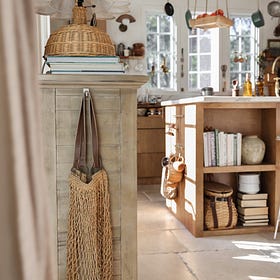I’ve been trying to untangle my thoughts about Home Economics for months. I took Home Ec in middle school back in the ‘90s, but it seems to have faded out of most school curricula since then. I recently heard that my local public middle and high schools offer a cooking class, so maybe it’s not entirely gone.

This topic interests me because I notice it’s trendy to complain about “adulting” and I see how hard it is for many to run a home. It’s not easy to do, so this is no criticism; I just wonder if we’d all have an easier time if we actually learned these important adult skills in school. Like people used to—or at least, some people sometimes used to.
Additionally, women often struggle under the mental load, the second shift, invisible labor, whatever you want to call it. The administrative work of being a person and running a household is severely under-acknowledged and under-valued. Would explicit Home Ec, done right, help with this?
Part of my mission in writing here is to professionalize the very real work involved in running a household. This not fluffy stuff; it’s hard work worth investing time and effort into getting right. The impact on home life, and by extension society, can be enormous.
Turns out the initial founders of Home Economics had a similar idea. This diverse group included abolitionists, feminists, wives of prominent scientists, among others, who aimed to spread best practices (sometimes problematically) and professionalize the work that women contributed in the home (and back then, it was always women).
I realize the way Home Ec was implemented in practice wasn’t always ideal. In my mind, an ideal Home Ec class would include things like:
Household safety. We require restaurant workers to take a food handling class, but why not teach everyone these important skills? Also, things like how to maintain healthy air quality indoors, check for gas leaks, etc.
Best practices for the daily operation of a house. How to do laundry, how often to change sheets and towels, how to safely and thoroughly clean a bathroom, and so on. Include ecologically mindful practices.
Cooking instruction.
Executive functioning. Some schools are starting to explicitly teach this, but it seems geared towards remembering homework more than remembering to take out the trash.
Personal finance. Even just teaching the concept of compounding would be revolutionary.
Cultural education. It endlessly expands my worldview to see and learn about other cultures and how they do things. (Small example: Many countries don’t use clothes dryers.)
My gut says we’d all benefit from such a class, but I also see it could be a minefield (like in the past when it was only offered it to girls).
I thought I’d open up a discussion with you thoughtful readers.
Do Share
Did you get Home Ec in school, or something similar? What was it like?
Do you see value in explicitly teaching these sorts of things? What do you wish you’d learned in school?
What intel can you share about Home Ec’s modern incarnation (I’m told it’s “Family and Consumer Sciences” now)? Do you know of schools offering this class?
Oldies but Goodies from the Archive
Get your priorities straight.
We know that at every concert or event there are the great seats and less good seats. Orchestra Center vs Rear Balcony. First Class vs Coach. And so on. Like it or not, for most everything in life there is the primo spot and the non-primo spot.
💬 Thread: What are you hilariously bad at?
I’ve been learning a lot about neurodiversity lately, and the “spiky profile” concept really struck a cord with me. The basic idea is that brains outside the neurotypical pattern can have uneven skill development. So you’ll end up really good at something but at the cost of being notably
How to avoid gifts
Gifts have always stressed me out — the obligation, the time crunch, the pressure to get it just right, the embarrassment if you sense the recipient doesn’t love it.
Less stuff, more joy
Something I love about living with fewer belongings is that you can take real pleasure in the items that remain. You can carefully consider how you arrange and use what you have, trying it this way and that, till you get it just right. This doesn’t mean you have to be a minimalist, just that everything in your home is there with intention.








In my generation, girls took home a house. Boys took woodworking. If we were to actually implement a proper home economics course, it would have to be taught to both girls and boys equally. And not be optional. I agree with the basic outline that you put up. I would put financial management at the top of the list. Rather Financial education At the top of the list. The debt load that many couples put themselves into early in their married life is a burden they carry for a long time. Teaching home economics with the emphasis on economics might give us a generation of people who can make long-term choices rather than short-term pleasures. They can figure out when to change the sheets on their own.
At my middle school (mid 1990s), we all took "Home and Careers" for half the year, and "Technology" for the other half. I remember learning to cook on the stove, how to safely use a microwave, and how to use a sewing machine (we all made boxer shorts) for the Homes part. Maybe there were some childcare/babysitting lessons? I don't remember cleaning. For the Careers part, we came up with a business idea as a class (I think we sold flowers at lunch), made resumes, and interviewed for jobs at our company.
In technology we used jigsaws and plastic injection molds to make tic-tac-toe games and built bridges out of toothpicks. Maybe there was a computer part too?
I think the list of elements of a Home Ec class you've come up with are interesting because there's a mix of things that are more objective (when is food safe to eat) and things are more subjective (how often do you need to change sheets) and things that seem like they could be or are covered in existing classes (I learned about compounding interest in math, about other cultures in social studies, ELA, and world language classes, and how to use a planner and get stuff done was explicitly part of my middle school curriculum).
I wonder if putting these things in a separate class, rather than integrating it into what school is generally, sends a message that this is something that one can opt in or out of.
My kids' middle school does not offer any Home Ec-ish class, and I haven't seen anything like that at the high school. My own high school offered a Life Skills class, but I'm not sure who all took it.